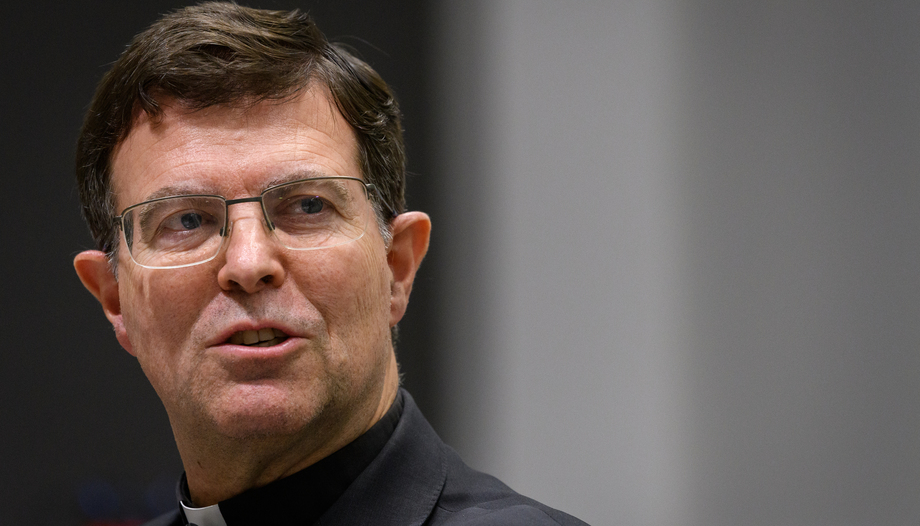On Thursday, December 14, the Omnes Forum "Benedict XVI. La razón y la fe" (Benedict XVI. Reason and Faith) was held on Thursday, December 14, with Fr. Ratzinger Prize 2023. The colloquium was moderated by Juan Manuel Burgos, president of the Spanish Association of Personalism.
Pablo Blanco is a professor of Dogmatic Theology at the University of Navarra, as well as being a member of the editorial committee that publishes in Spanish the works of the Pope Emeritus at the University of Navarra. BAC Publishing House. In addition, he is the author of numerous publications in publishing houses such as BAC, Rialp, Word, Cristiandad Editions, San Pablo, o Planet.
The Forum, held at the Villanueva Universityhas been sponsored by Banco Sabadell and the CARF Foundation.
In the first place, Professor Blanco reflected on Joseph Ratzinger's relationship with faith, "a golden thread that runs through all his thought", but which, moreover, is a "distinctly Christian" aspect, since Christianity has never hesitated to "enter into dialogue" with philosophy and intellectuals. "Reason and religion is something that is in the DNA of Christianity," said Professor Blanco, and this relationship differentiates Christianity from other religions.
Regensburg Speech
Pablo Blanco then went on to analyze in depth the Ratsibona speech, one of Ratzinger's most famous interventions, since it was initially the cause of great controversy due to a quote from the Byzantine emperor Manuel Paleologus II in which he spoke of Islam.
However, Professor Blanco explained that initially it was a purely academic discourse, from which "the whole was taken for the part". The original purpose of this passage was to explain that truth can only be proposed, not imposed. "It was a peaceful affirmation, but it set fire to a trail of gunpowder," explained the Ratzinger Prize winner.
Logos
On the other hand, in relation to the theme of reason in the Western world, Pablo Blanco explained that logos is understood in Ratzinger's discourse as creative reason, so that reason and love are intimately united. "With our rational capacity we can understand nature and reach the Logos with capital letters. Through created things we can know the world and God". Professor Blanco pointed out that "this is a provocation in the German world".
Moreover, "the union between the Greek logos and faith is a constant in Christianity". Contrary to the assertions of Adolf Harnack, who accused Christianity of having been Hellenized, or rather, Platonized, Ratzinger affirms that the opposite is true: Christianity has Christianized Hellenism.
Habermas
On the other hand, Pablo Blanco has also focused on the relationship between the philosopher Jürgen Habermas and Ratzinger. Habermas wanted to establish a bridge between faith and reason because, although he was an atheist, he saw the need for a "moral energy" that Christianity could provide. Faith and reason can "heal" each other: reason can prevent fundamentalism in faith, and faith can prevent reason from leading to situations like Auschwitz. However, after the Regensburg speech, Habermas claimed that Ratzinger was "anti-modern" because he interpreted his speech as an attempt to return to the dialogue between faith and reason of the Middle Ages.
However, Professor Blanco claims that this is a failure to understand Ratzinger's thought in depth, since what he is doing is revising the Enlightenment concept of reason.
Conclusions
Finally, the rereading of the speech led to an understanding and the Abu Dhabi declaration between Pope Francis and the Grand Imam of al-Azhar in 2019. "There has never been so much dialogue between Catholics and Muslims as as a result of this speech, and the dialogue continues," says Pablo Blanco.
Concluding his reflection, the Ratzinger Prize winner commented, using the expression of Pope Francis, that Ratzinger's theology is "a kneeling theology, and not an office or laboratory theology (...) It is a living theology. It is symphonic, everything connects with everything".
At the end of the colloquium, the attendees were able to ask Professor Blanco their questions and the director of Omnes, Alfonso Riobó, thanked everyone for attending and the sponsors for their collaboration.
A full report of the meeting will be available in the next issue of Omnes magazine.









